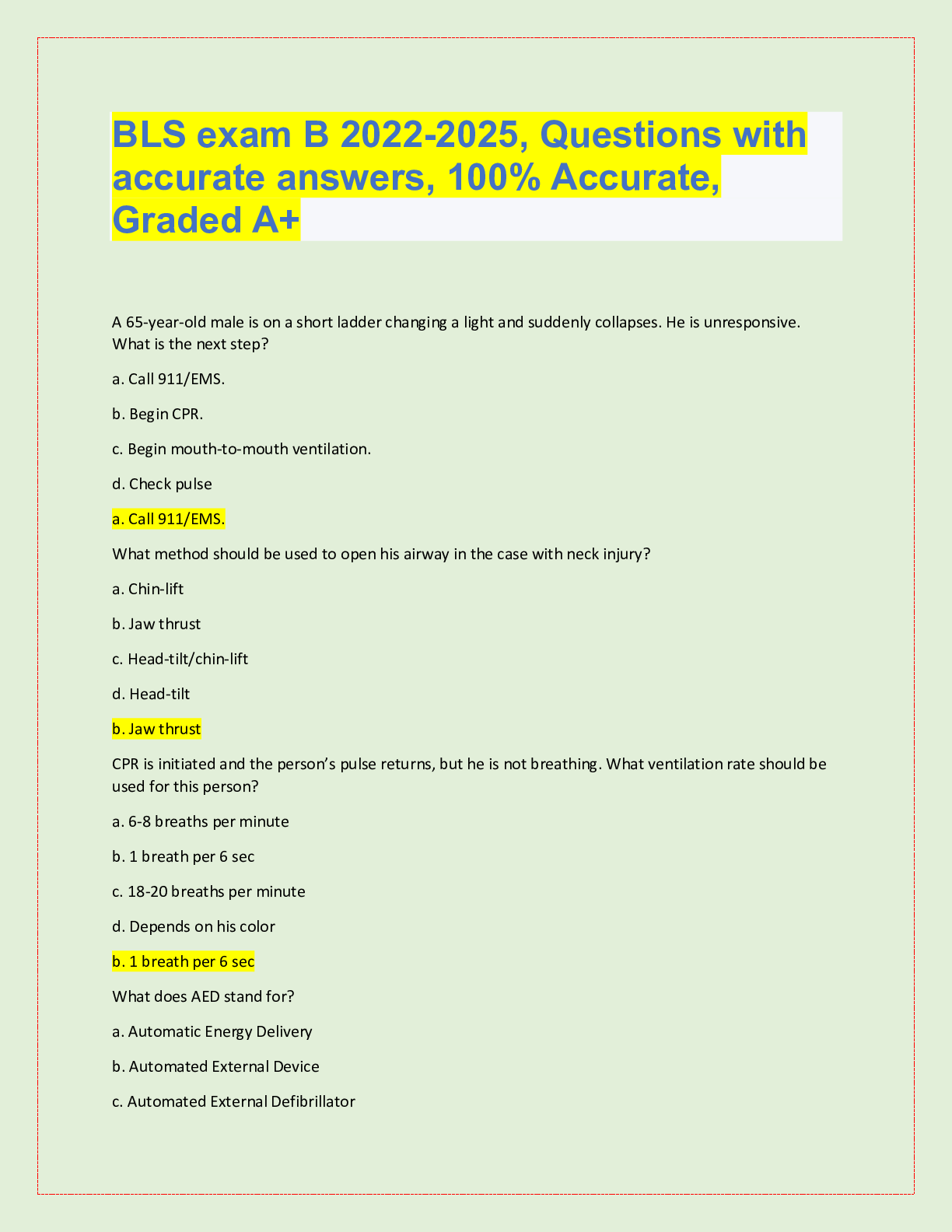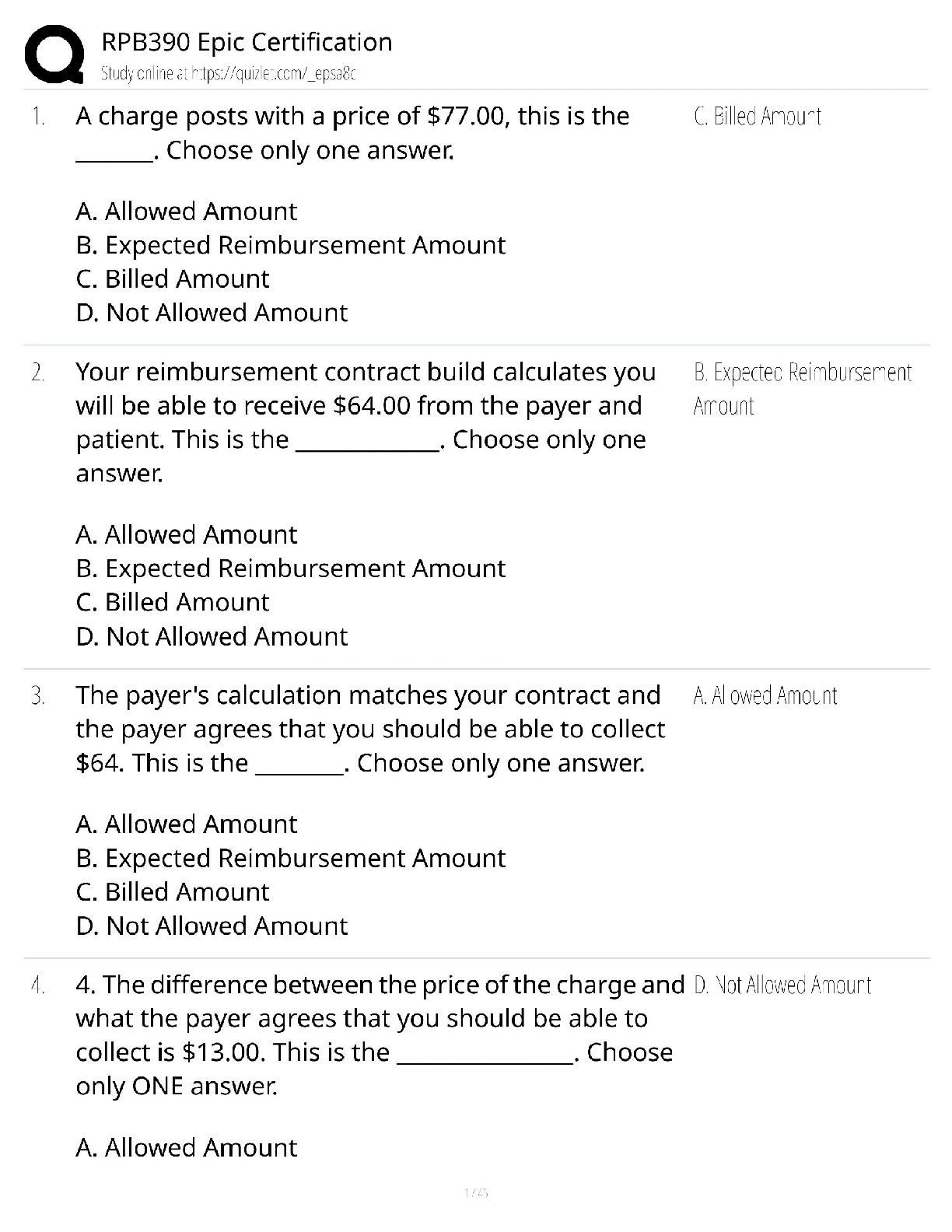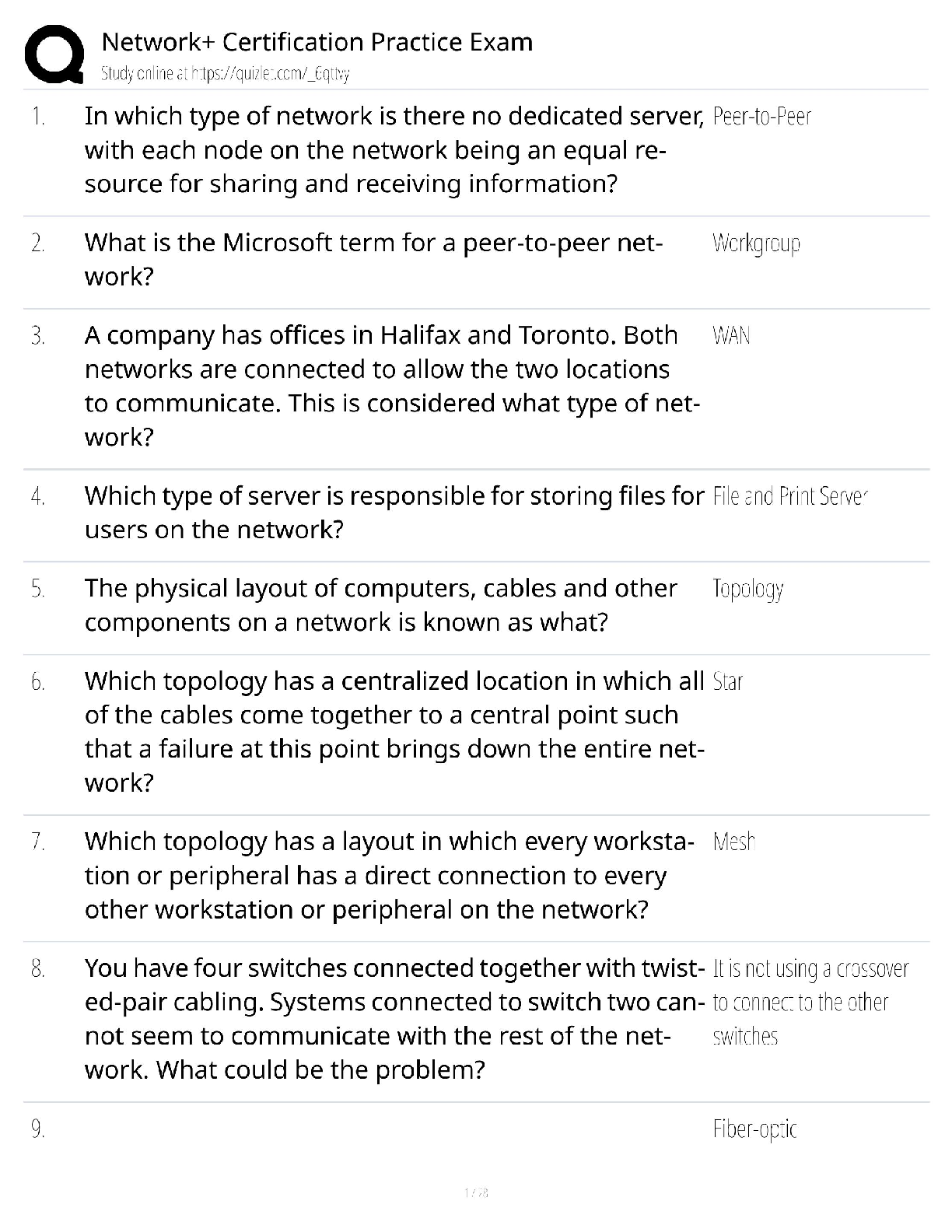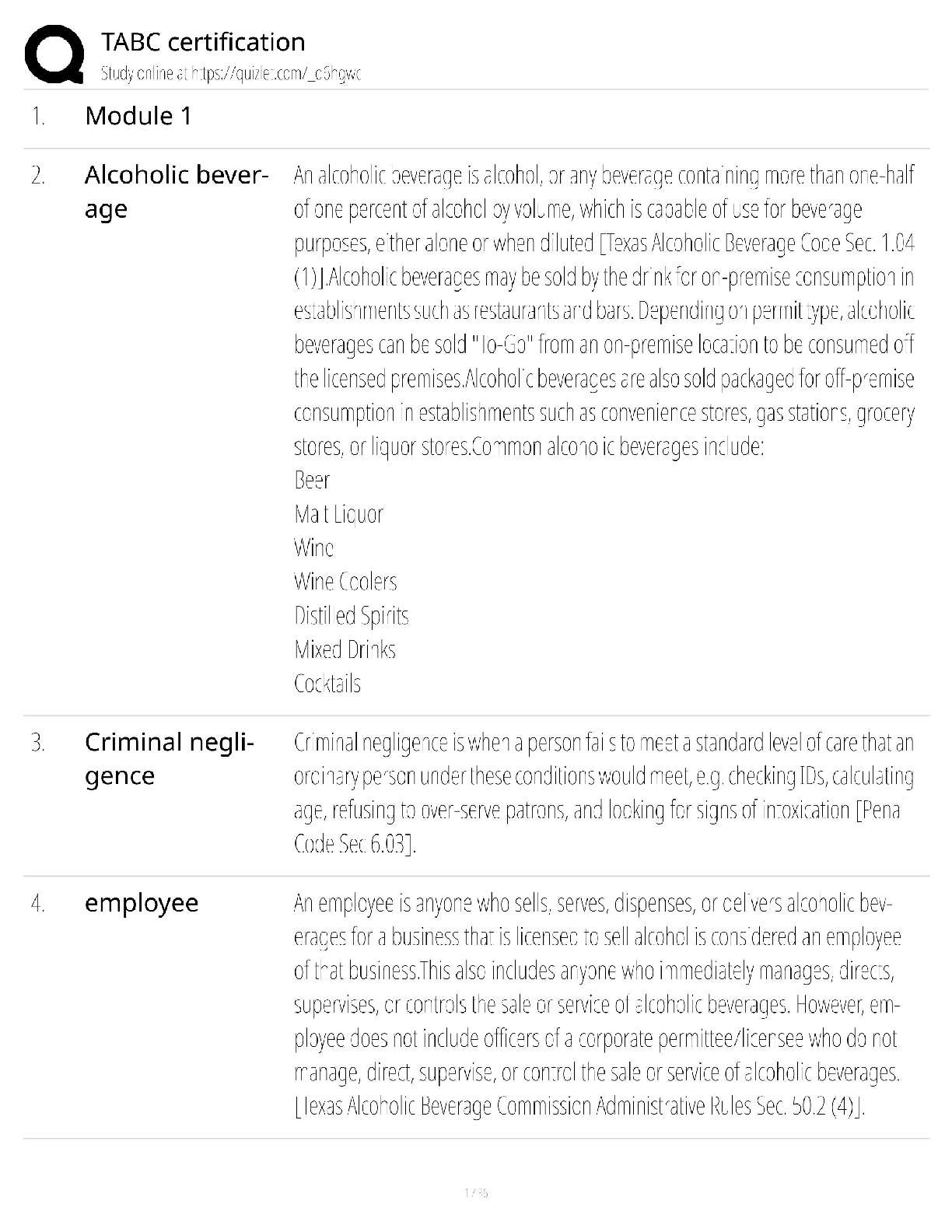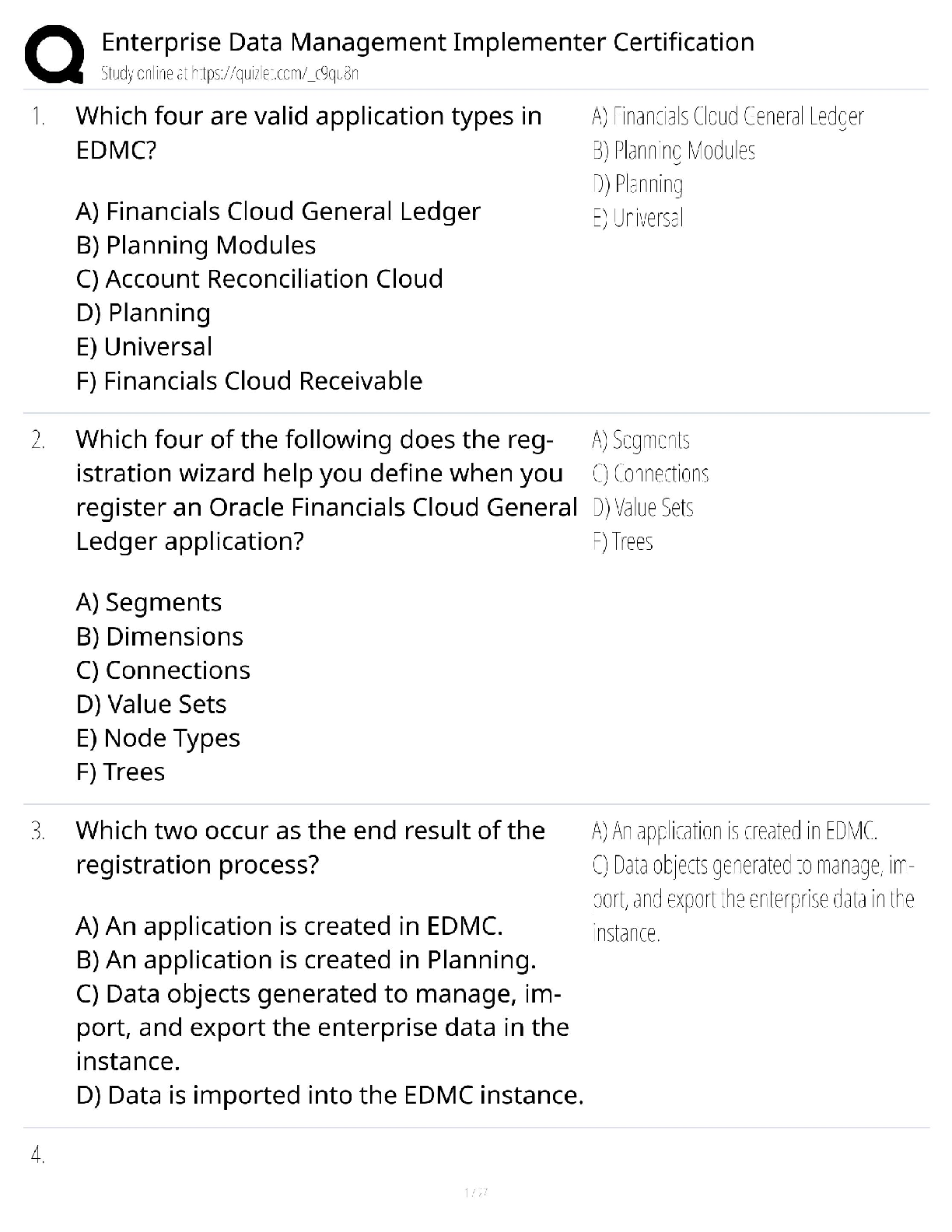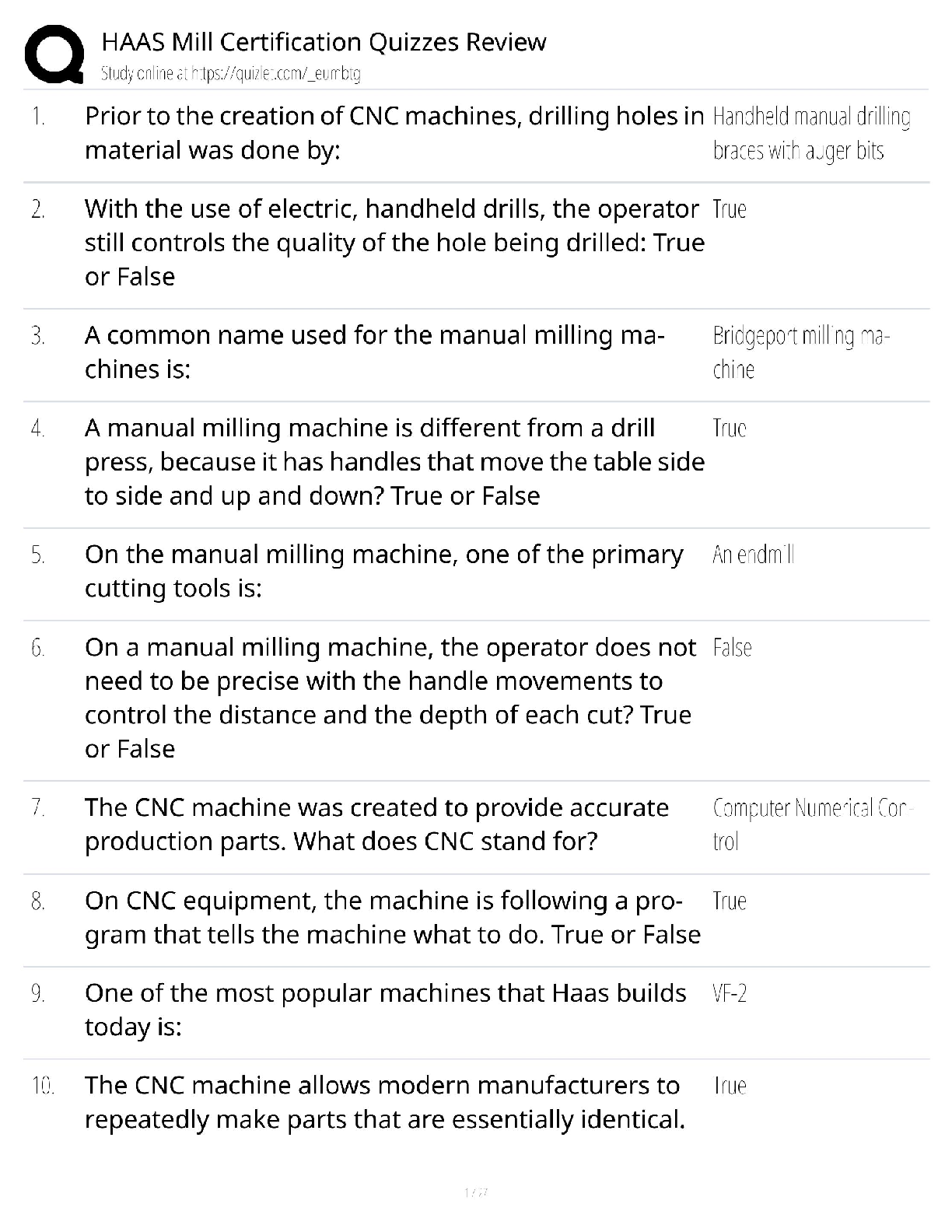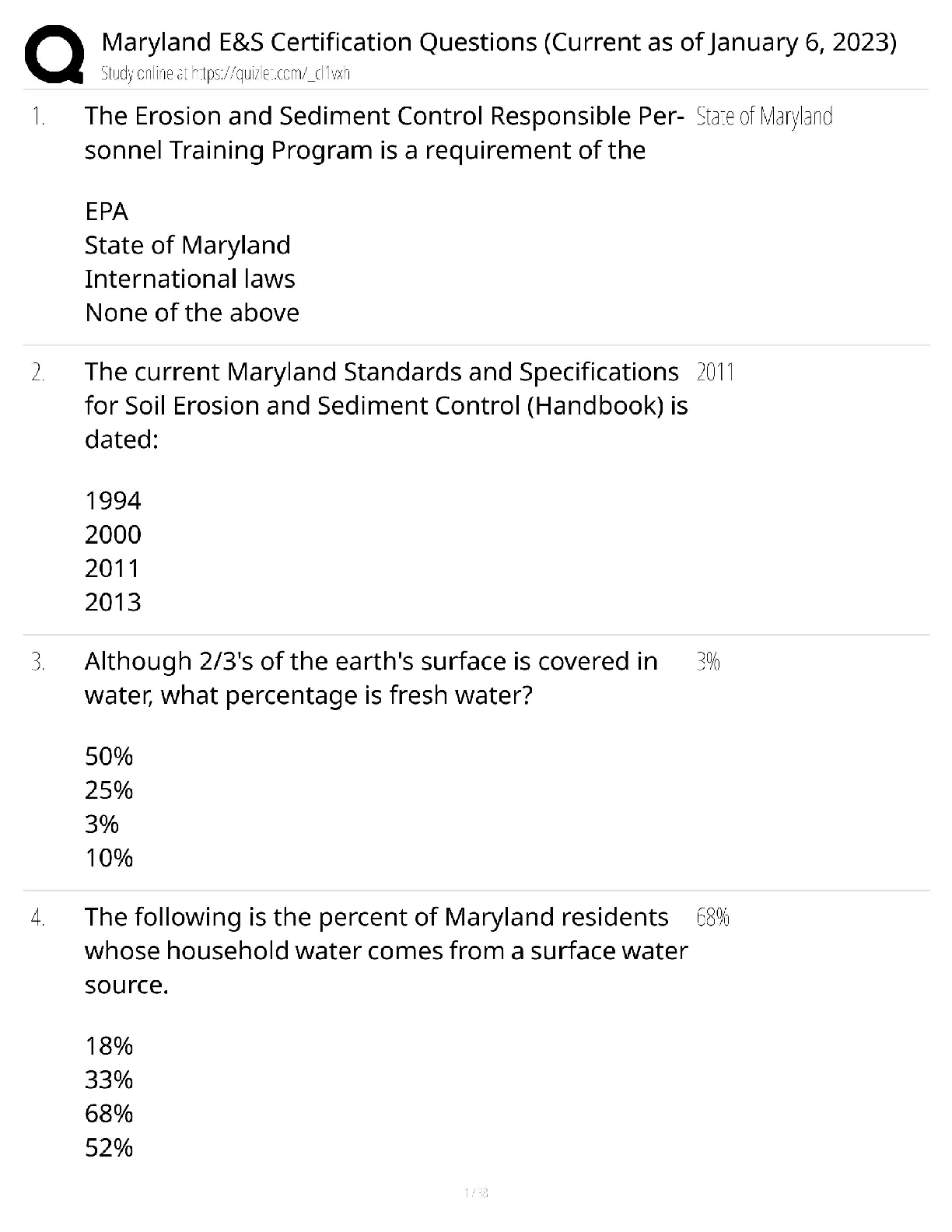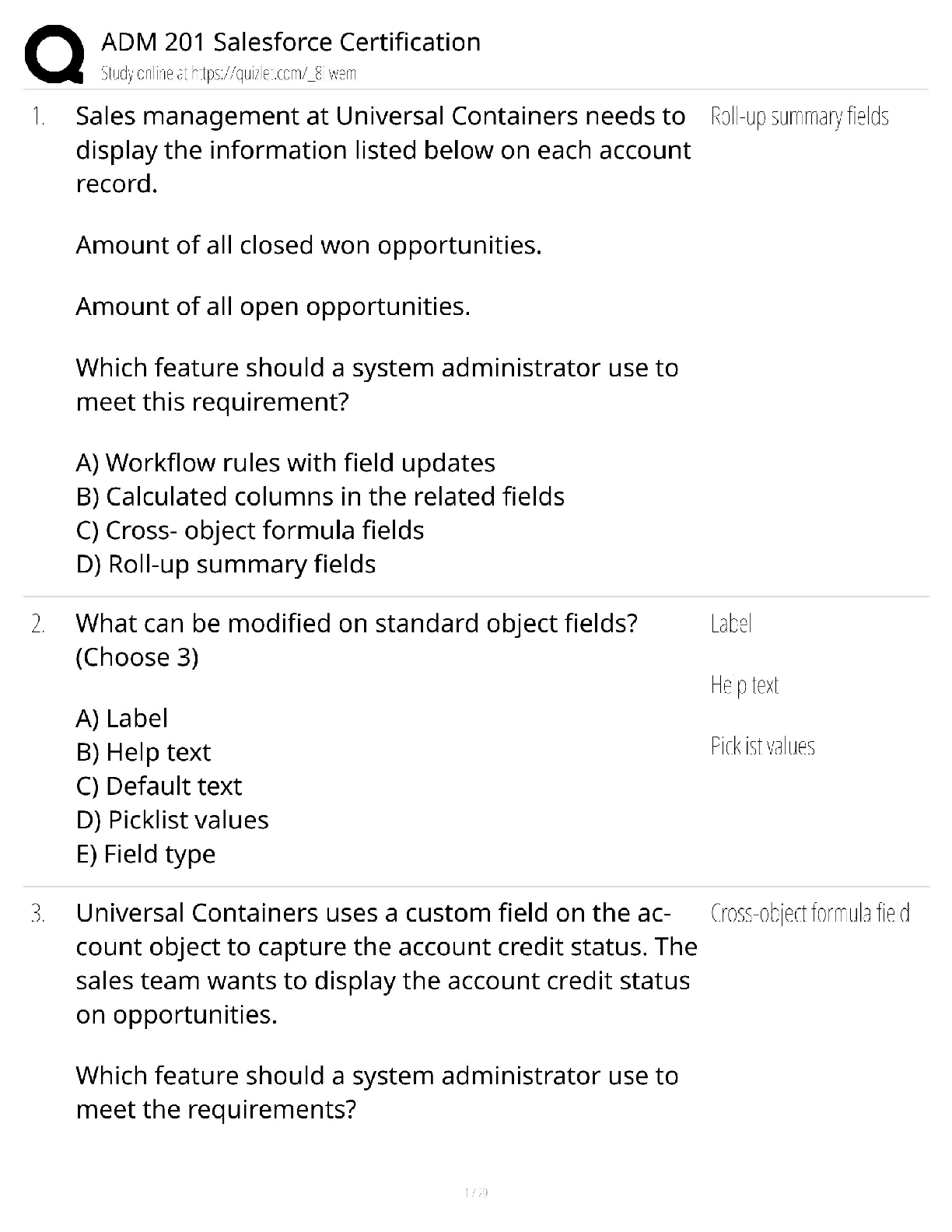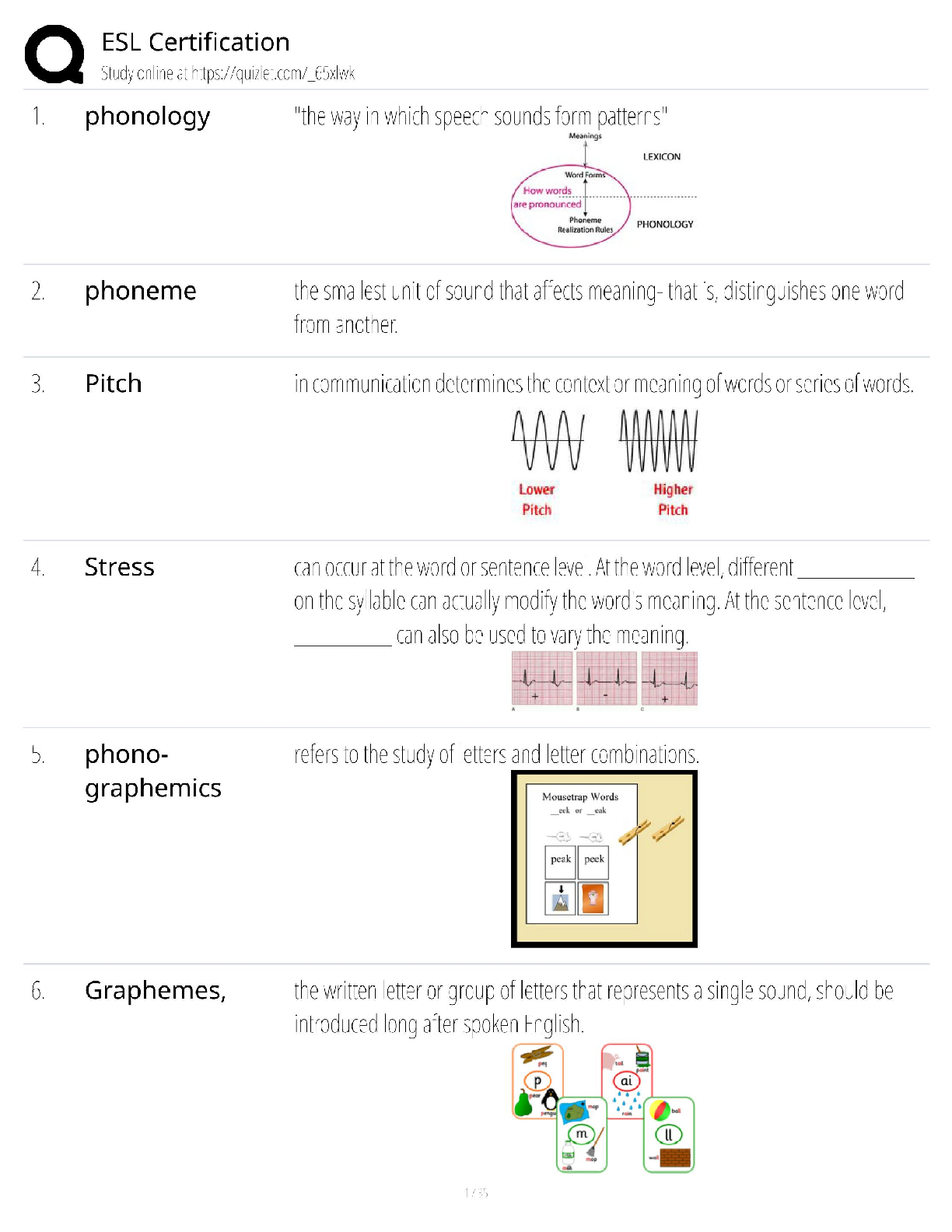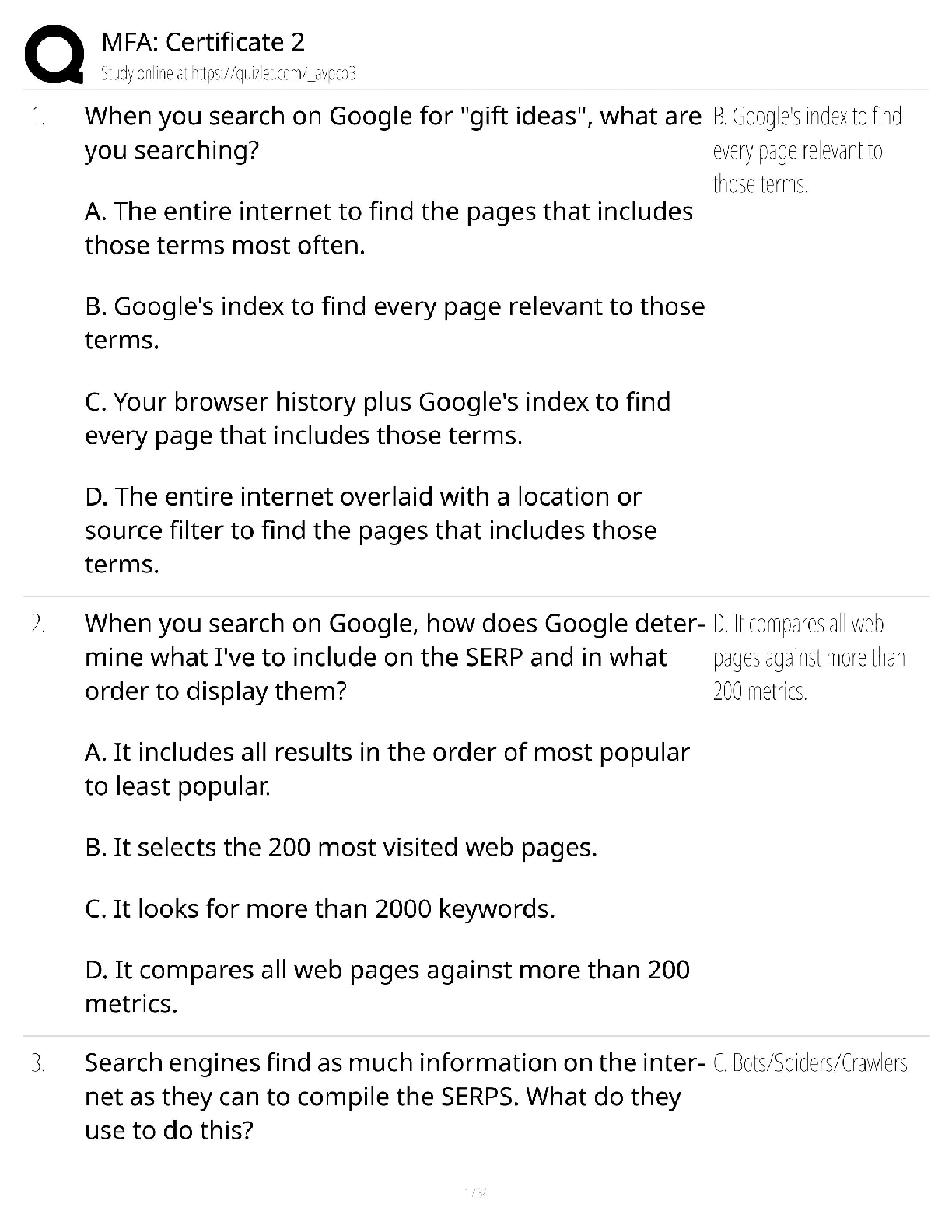*NURSING > QUESTIONS & ANSWERS > LMSW Exam Pool Questions & Answers. Exam Preview. 100% Verified. (All)
LMSW Exam Pool Questions & Answers. Exam Preview. 100% Verified.
Document Content and Description Below
LMSW Exam Pool Questions & Answers. Exam Preview. 100% Verified. AASPIRINS - ✔✔-A: acknowledge & assess S: start where the client is P: protect Life (preventing danger to self and others) I: ... informed Consent R: rule out medical conditions, send to Dr. if medical I: intoxication (don't treat if intoxicated) N: non-judgmental S: support self-determination For "Best"/"Worst" or "MOST reasonable" questions AREAFI - ✔✔-What to do "FIRST" or "NEXT": A: Acknowledge/Assess feelings R: Refer E: Educate A: Advocate F: Facilitate I: Intervene Levels of cognition - ✔✔-knowledge (teaching facts, theories, etc) comprehension application analysis synthesis (creating something new) evaluation (judging quality) Maslow's Hierarchy of Needs - ✔✔-Physiological Safety Love/belonging Esteem Self-actualization Types of groups - ✔✔-Shared problem, Counseling, Activity self help, natural group, closed group, open group, structured, reference, crisis Individual self-actualization occurs through... - ✔✔-- release of feelings that block social performance - support from others - orientation to reality and check out own reality with others - reappraisal of self Bowenian Family Therapy - ✔✔-change through understanding multigenerational dynamics -driven to achieve balance of internal and external differentiation Logotherapy - ✔✔-change through finding meaning in life, understanding purpose Problem solving therapy (aka Task Centered) - ✔✔-change through supporting client to take actions to address problems; client defined problems -Short term -Good for lower functioning, schizophrenia, homeless Dialectical Behavior theory - ✔✔-Aims to change behavioral, emotional, and thinking patterns associated with dysfunction -teaches mindfulness, suicidal behavior, emotional regulation, interpersonal effectiveness • Good for Borderline Personality Disorder Narrative therapy - ✔✔-Change occurs by externalizing problem and creating a new narrative or story, which emphasizes the client's competencies and strengths. -Problem separate of client, externalize the problem Feminist Therapy - ✔✔-Change through recognizing disempowering social forces and empowering client. -Good for eating disorders. Emotional Triangulation - ✔✔-Network of relationship between 3 people. Stable until anxiety starts between dyad, then 3rd party is used to reduce anxiety. structual family therapy - ✔✔-SW engages family in restructuring; boundaries are determined with Interpersonal, boundaries w/ outside world, hierarchal organization of the family Interpersonal family structure - ✔✔-Family is defined. Promoted differentiation and autonomy Boundaries of the outside world (Structural family therapy) - ✔✔-Defines family. Must be permeable enough to maintain well functioning open system hierarchal organization (Structural family therapy) - ✔✔-in all families and cultures. Maintained generationally; parent-child roles, rights, obligations, etc. Strategic Family Therapy - ✔✔-- Pretend technique -1st order changes (superficial behavior changes) -2nd order changes (systematic interaction patterns) -Family homeostasis (preserve family organization and communication) -Relabeling (change label attached to problem or person) -Paradoxical directive (prescribe symptomatic behavior so client realize it can be controlled) Suprasystem (systems theory) - ✔✔-An entity that is served by a number of component systems organized in interacting relationships Throughput (system theory term) - ✔✔-Energy that is integrated into the system so it can be used by the system to accomplish its goals Subsystem (systems theory) - ✔✔-A major component of a system made up of 2+ independent components that interact in order to attain their own purpose(s) and the purpose(s) of the system in which they are embedded SOAP format (Assessment) - ✔✔-Subjective: How are they doing since last visit Objective: Vitals, physical exam, lab results Assessment: Tasks S & O into short assessment Plan: Done after assessment; treatment plan Mental Status Exam (MSE) - ✔✔-Appearance Orientation (Time place events) Speech (Slurred, pressed, slow) Affect/Mood Impulsivity (Potential of harm) Judgement/Insight (Predict consequences) Thought process (reality, thinking style) Intellectual function/memory Suicide Assessment (Danger to self) - ✔✔-- Hx of attempt/family hx - Lives alone, no social support - Psych disorders (depression, anxiety) - Substance use/abuse - Media & peer exposure - Losses - Firearms or lethal weapons Suicide Protective Factors - ✔✔-- Social support, family connectedness - Coping skills -Access to clinical care/Treatment - Religion & participation in religious activities - Limited access to lethal methods Risk Assessment (Suicide/Violence) - ✔✔-- Frequency, intensity & duration of suicidal or violent thoughts - Access to available methods - Availability/inability to control suicidal/violent thoughts - Ability to not act on thoughts - Factors making client feel better/worse -Consequences of actions - Deterrents to action - Using drugs/alcohol - Measures client uses to remain safe Community Strength & Challenges - ✔✔-People, Partnerships, Facilities, Organizations, Policies, Regulations, Culture Delusions - ✔✔-false beliefs, often of persecution or grandeur, that may accompany psychotic disorders Endogenous depression - ✔✔-chemical imbalances in the brain rather than as a reaction to life events Exogenous depression - ✔✔-depression caused by external events or psychosocial stressors Folie a deux - ✔✔-shared delusion Postmorbid - ✔✔-subsequent to the onset of an illness Premorbid - ✔✔-before the onset of major symptoms Psychotic - ✔✔-experiencing delusions or hallucinations contraindicated - ✔✔-not recommended under these circumstances AntiAnxiety & Panic Disorder - ✔✔-Ativan, Buspar, Klonopin, Valium, Xanax ADHD/ADD Stimulants - ✔✔-Adderall, Concerta, Dexedrine, Ritalin Antidepressants (SSRIs) - ✔✔-Celexa Lexapro Luvox Paxil Prozac Zoloft Antidepressants (Tricyclics) - ✔✔-Anafranil Asendin Elavil Norpramin Pamelor Aventyl Surmontil Trofranil Vivactil Antidepressants (MAOI) - ✔✔-Nardil Parnate *Avoid alcohol & aged foods Antidepressants (Others) - ✔✔-Effexor Desyrel Remeron Serzone Wellbutrin Mood stabilizers (Anti-Manic/Bipolar) - ✔✔-Depakote Lamictal Lithium Abilify Antipsychotics (Schizoprenia & Mania) - ✔✔-Haldol Clozaril- need blood work done Thorazine Seroquel Risperdal Zyprexa Tardive dyskinesia (TD) - ✔✔-Abnormal, involuntary movement of tongue, jaw, lips, & face; twitching and snakelike movement of extremities as a result of a high dose of antipsychotics over time Assessment of Violence (Danger to others) - ✔✔--Youth under 13 y/o who commit crimes & escalating violence -Aggression, associated w/ drugs, alcohol & risky behavior -Delinquent peers & gangs Assessment of violence (protective factors) - ✔✔-Programs, individual risk & environment Target social context of change Access to clinical care Support system Coping skills Restrict access to lethal weapons Social Work Values - ✔✔-1. service 2. social justice 3. dignity and worth of the person 4. importance of human relationships 5. integrity 6. competence Ethical Problem Solving - ✔✔--Identify ethical standards being compromised -Determine if there is an ethical dilemma -Weigh issues in light of SW values & ethics -Suggest modifications -Implement modifications -Monitor for new dilemmas Payment (SW Ethics) - ✔✔-Fees are fair, reasonable & commiserate w/ service. Bartering accepted only when it is acceptable in the local community Lack of Decision Making (SW Ethics) - ✔✔-Act of behalf of client and safe guard against ill interest Referrals (SW Ethics) - ✔✔-Refer for specialized knowledge Termination (SW Ethics) - ✔✔-When services & relationships are no longer required or of interest Commitment to clients (SW Ethics) - ✔✔-Promote wellbeing in client's interest; larger society or legal obligations may supersede loyalty to client Self-determination (SW Ethics) - ✔✔-Respect and promote the right of clients and assist clients to identify goals and clarity informed consent (SW Ethics) - ✔✔-An ethical principle that clients are told enough to enable them to choose whether they wish to participate; state purpose of service, risks, limits, costs, alternatives, right to refuse or withdraw consent, time frame of consent Cultural Awareness - ✔✔-Understand culture and its function in human behavior and society Conflict of Interest (SW Ethics) - ✔✔-Avoid interfering w/ exercising professional discretion and impartial judgement. No dual/multiple relationships Privacy and Confidentiality (SW Ethics) - ✔✔-the responsibility we have to protect the privacy of patients and maintain the confidentiality of their medical information. Need consent for information release Access to Records (SW Ethics) - ✔✔-Provide reasonable access to records Sexual relationships & physical contact (SW Ethics) - ✔✔-None under any circumstances Short Term Intervention - ✔✔-Psychodynamic Crisis intervention Cognitive behavioral therapy case management - ✔✔--Assessment -Planning -Linking -Monitoring -Advocacy Evaluation (research) - ✔✔--Quantitative info -Improvements -Symptom progress -Qualitative info Conflict resolution - ✔✔-1. Recognize existing potential conflict 2. Assess conflict 3. Select strategy 4. Intervention Intervention escalation - ✔✔--Decrease contact -Decrease time between sessions -Decrease formality of sessions -Limit scope fo issued that can be discussed -Use 3rd party mediator Social Work Process - ✔✔-1. Engaging 2. Assessing 3. Planning 4. Intervening 5. Evaluating 6. Terminating *Enhances mental emotional and action capabilities Qualitative measurement - ✔✔-info that is not numerical (Open ended surveys, unstructured interviews, observations) Quantitative measurement - ✔✔-collecting data involving numbers that can be statistically manipulated (number of clients, survey w/ a Likert scale) Task Centered Practice - ✔✔--quickly engage clients in problem-solving process&to maximize their responsibility for treatment outcomes -focus on here and now - client must be able to identify a precise psychosocial problem/solution confined to specific change in behavior or change of circumstances - client must being willing to work on problem establish relationship quickly - termination begins almost immediately upon onset of treatment Crisis intervention - ✔✔-- relieve the impact of stress with emotional and social resources -return a clients to a previous level of functioning -help strengthen mechanisms during the crisis period -develop adapting coping strategies -4-6 weeks; directive, high level activity/involvement -local worker sets specific goals and task in order to increase a clients sense of mastery and control. Phases of Intervention - ✔✔--Engagement -Assessment (Strengths and needs) -Planning/Design intervention -Intervention -Evaluation -Termination Stages of Change Model - ✔✔--precontemplation -contemplation -preparation -action -maintenance -relapse Change strategies - ✔✔--modify systems (one on one or larger system) -modify individual thoughts (change interpretation & statements) -modify actions (behavior modification) -advocacy (secure change) -Mediator (negotiates) -modify feedback (alter reinforcement) Motivation Techniques - ✔✔--identify problem or risk -explain why change is important -advocating change -identify barriers -best course of action -setting goals -taking steps to change -preventing relapse *empathy increases motivation & lowers resistance Universalism (SW Values) - ✔✔-One acceptable norm or standard for everyone dichotomous thinking - ✔✔-"either or" thinking; different are inferior, wrong or bad Roles in Problem Solving - ✔✔-consultant advocate case manager catalyst broker mediator facilitator instructor mobilizer recourse allocator Social role theory - ✔✔-Role ambiguity (no clear role) Role complementarity (carried out as expected; Parent-child role) Role discomplementarity (roles conflict or expectations differ) Role reversal (2+ individuals switch roles) Role conflict (Incompatible/conflicting expectations) Transferece - ✔✔-Client feelings redirected; unconscious, reveal unresolved conflicts Counter Transference - ✔✔-redirection of SW feelings to client; emotional entanglement Community Intervention - ✔✔--Problem recognition/ Problem definition (seek focus and identify cause of problem) -Information gathering -Goal setting -Operation (implement activities on goal) -Evaluation -Community continues activities Empathy - ✔✔-Understanding involves being non-judgmental, accepting and genuine *positive relationships are an important tool of helping Empathetic communication - ✔✔--communication style; rapport with clients -starts where a client is and stays attuned -increases the level at which clients explore themselves and their problems -responds to nonverbal communication -decreases defensiveness and engages client in processing and testing new info -defuses anger that represents obstacles to progress -->encourages more rational discussion and sets the stage for problem solving problem solving process - ✔✔-E.A.P. A. Being engaged (Engaged) B. Assessing client situation in order to select appropriate goals & means of attaining (Assessment) C. Planning how to employ means (Planning) *Resistance--> clarify the process and specify what will happen and discuss ambivalence Types of interactions - ✔✔-Verbal-- natural Non-verbal-- Gestures, facial expression, eye movement *Humans act in terms of their feelings, attitudes, and understanding; must be taken into account and explore if the helping process is to result in change Group Development - ✔✔-Forming- Pre-affiliation, trust building Storming- power and control Norming- Intimacy; utilize self in group Performing- Differentiation and acceptance of others Termination- Separation and independence Factors affecting groups - ✔✔--Size -homogeneity -participation -interdependence -member stability Groups help to - ✔✔-Instill hope Universality Altruism Interpersonal learning Self understanding and insight Service (SW Ethics) - ✔✔-Primary goal of SW. Help people in need to address social problems Social justice (SW Ethics) - ✔✔-Challenge injustice Dignity and worth (SW Ethics) - ✔✔-Respect inherent dignity and worth of others Human Relationships (SW Ethics) - ✔✔-Social workers recognize the central importance of human relationships Integrity (SW Ethics) - ✔✔-Behave in trustworthy manner Competence (SW Ethics) - ✔✔-Practice within areas of competence and develop and enhance professional expertise ` group polarization - ✔✔-group decision making when discussion strengthen a dominant point of view and result in a shift to more extreme position than any of the members would adopt on their own Preconscious - ✔✔-contains material just bene [Show More]
Last updated: 2 years ago
Preview 1 out of 40 pages

Buy this document to get the full access instantly
Instant Download Access after purchase
Buy NowInstant download
We Accept:

Also available in bundle (1)
Click Below to Access Bundle(s)
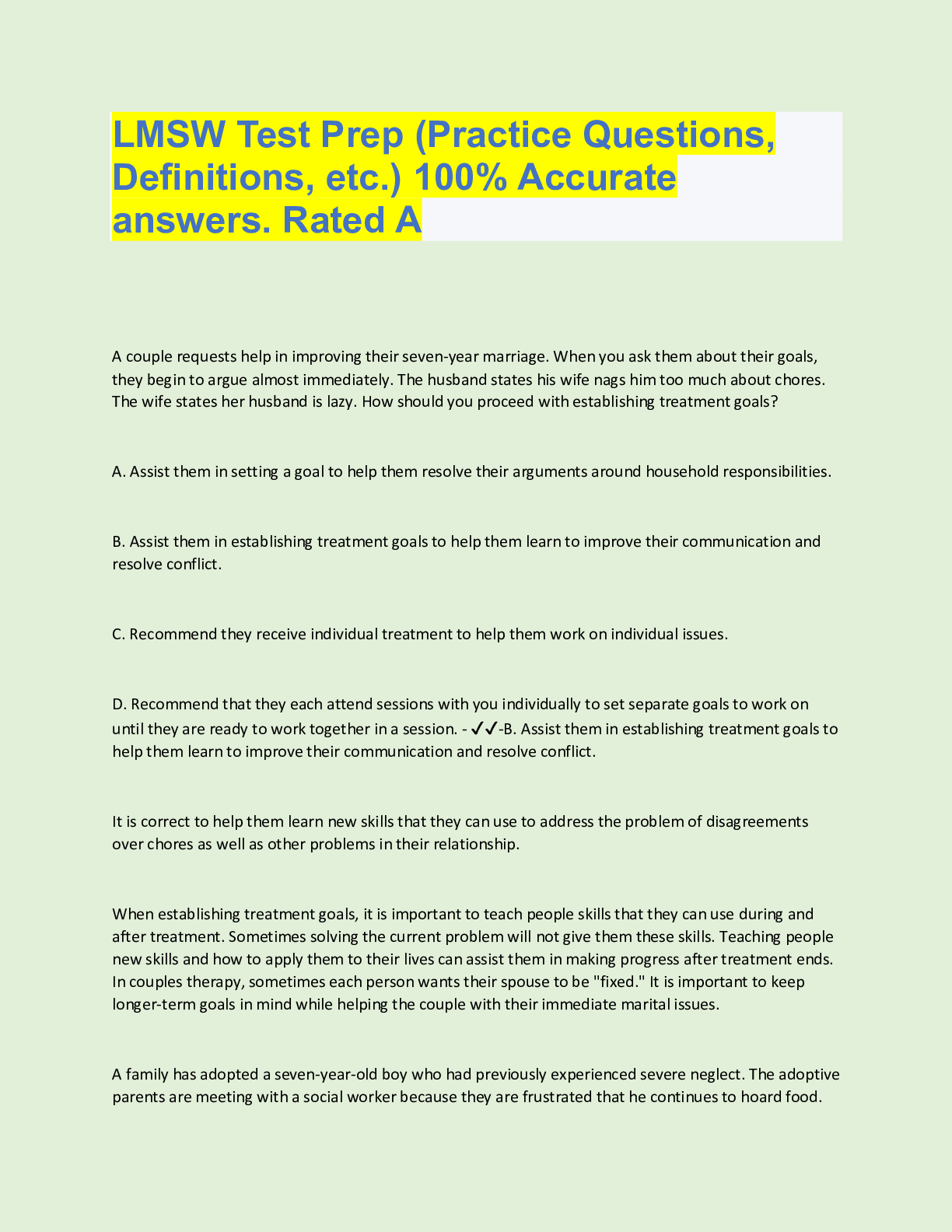
LMSW EXAM BUNDLE. Practice QUESTIONS (ANSWERED)
LMSW Practice Questions & Answers, 100% Accurate, Graded A+. APPROVED.
By Topmark 2 years ago
$36
17
Reviews( 0 )
$12.00
Can't find what you want? Try our AI powered Search
Document information
Connected school, study & course
About the document
Uploaded On
Mar 14, 2023
Number of pages
40
Written in
All
Additional information
This document has been written for:
Uploaded
Mar 14, 2023
Downloads
0
Views
138

